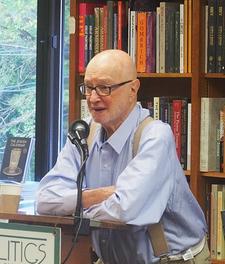Jules Feiffer, the Pulitzer Prize-winning cartoonist and writer "whose prolific output ranged from a long-running comic strip to plays, screenplays and children's books," died January 17, the Associated Press reported. He was 95. His latest book, a graphic novel for young readers titled Amazing Grapes, was published by Michael di Capua Books last September.
 |
|
| Jules Feiffer at Politics & Prose in 2018 (via) | |
A versatile creator, Feiffer won a 1986 Pulitzer Prize for his cartoons, and his animated short film, Munro, won a 1961 Academy Award. The Library of Congress held a retrospective of his work in 1996. The AP noted that he "hopscotched among numerous forms of expression, chronicling the curiosity of childhood, urban angst and other societal currents. To each he brought a sharp wit and acute observations of the personal and political relations that defined his readers' lives."
In 1956, Feiffer made his debut in the Village Voice, where his strip, called "Feiffer," ran for more than 40 years. He quit the Voice in 1997 after a salary dispute, but his strip continued to be syndicated until he ended it in 2000.
Feiffer's work included novels, beginning with Harry the Rat with Women (1963), and he wrote plays, including 1967's Little Murders," which won an Obie Award. His screenplays ranged from the 1980 film version of the classic comic Popeye to Carnal Knowledge (1971).
After disappointing reviews of his 1990 play Elliot Loves, Feiffer focused on children's literature. Having illustrated Norton Juster's book The Phantom Tollbooth (1961), he "brought a wry wonder to bear on his own books for young readers, starting with 1993's The Man in the Ceiling," the AP noted.
His other books include The Unexpurgated Memoirs of Bernard Mergendeiler (1964), Feiffer's Marriage Manual (1967), Jules Feiffer's America: From Eisenhower to Reagan (1982), A Barrel of Laughs, a Vale of Tears (1995), I Lost My Bear (1998), Bark, George (1999), Backing into Forward: A Memoir (2010), and Smart George (2020).
Feiffer had spoken recently about his macular degeneration and how it was affecting his work, the Guardian wrote. "The illusion is that I see as good as I've ever seen, which is not true, but it's the illusion," he said. "And I proceed with each drawing from page to page with complete confidence that it will turn out exactly as I want, which is not always the case. Failure is a big part of my process." He also spoke about his next book which would be titled My License to Fail.
The Washington Post noted that, in surveying his long, varied career, Feiffer wrote in his memoir that it took a new turn each time he was "backed into a corner," rather than as a result of any conscious planning. "It's a good thing I had no direction," he concluded. "I might have given up."

